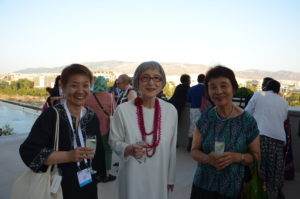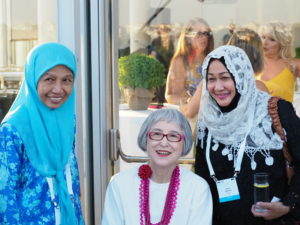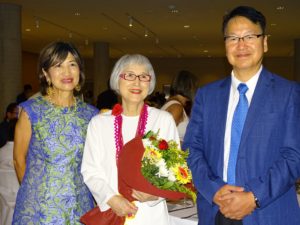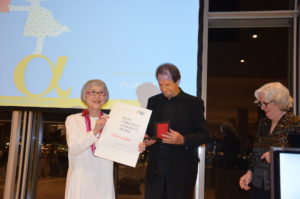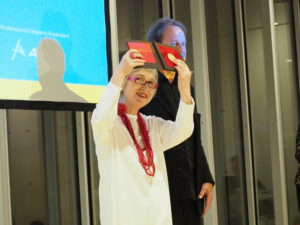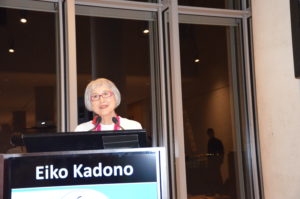【第36回IBBY世界大会】2日目-2(8/31)国際アンデルセン賞授与式
2018年9月12日
2日目の晩は、国際アンデルセン賞の授与式でした。
会場は港の近くの国立オペラハウス、すばらしい図書館が隣接した近代的な大きな建物です。遠くの山並みまで見渡せる上階のオープンテラスでウエルカムドリンクがふるまわれると、各国からの参加者たちが、2018年国際アンデルセン賞作家賞を受賞した角野栄子さんにお祝いを述べに集まりました。その後、授与式とパーティが行われる会場へ。会場には、清水康弘 駐ギリシャ日本大使もご夫妻で出席してくださいました。
アルダナ国際選考委員長から講評が述べられた後、ドンケルIBBY会長から、メダルと賞状が手渡されました。
角野さんは、受賞のことばを、英語の字幕が映し出された大きなスクリーンを背に、ゆったりとした日本語で話されました。
以下、全文です。
カリスペラ(こんばんは)、角野栄子です。
この度は国際アンデルセン賞という栄誉ある賞をいただき、心から感謝申し上げます。
第二次世界対戦が終わってまもない頃、子どもの文学を通して、これからの世界の平和を願ったIBBY創設者であるイエラ・レップマンの高い志に、心からの敬意を表します。この戦争のまっただ中、私は日本の10歳の女の子でした。あの過酷な時期を本によって、どれほど慰められ、生きる勇気を与えられたかを実感しております。ですから、この賞は私にとって、特別な意味を持っています。
そして、IBBY会員の皆様、またこの賞の選考にご尽力された皆様、私の愛する編集者たち、そして、何より私の本を読んでくださった沢山の読者に、心から御礼申し上げます。ありがとうございました。
さて、ここで私の思い出の「オノマトペ」をひとつ声に出していってみようと思います。
どんぶらこっこーう すっこっこーう
どんぶらこっこーう すっこっこーう
みなさん、どんな情景を思い浮かべましたか?
一人一人お答えをお伺いしたいところですが、時間がかかりますので、私がお答えいたしましょう。これは日本の昔話の冒頭に出てくる言葉です。五歳で母をなくして泣き虫だった私を、父は膝の中に座らせて、体を揺らしながら、このようにお話を語り始めました。
「川上から大きな桃が、『どんぶらこっこーう すっこっこーう』って流れてきました。この桃を、川で洗濯していたおばあさんがすくいあげ、家に持ち帰り、食べようとすると、中から男のあかちゃんが『オギャーオギャー』と泣きながら生まれてきたのです。」
この「桃太郎」という昔話は、日本人であれば、だれでも知っているお話です。この桃が川を流れてくるときの「オノマトペ」は語る人によって様々です。私の父はいつも、「どんぶらこっこーう すっこっこーう」と歌うように言いました。今でも、私のこの耳のあたりに聞こえています。とっても懐かしい。
日本の家は、玄関や窓などの開口部が大きくできています。引き戸になっていて、朝起きて全部開けると、家の中と外の世界は一体になります。家の中も、部屋を仕切る障子や襖(引き戸)をあければ、他の部屋や廊下とつながるように作られています。現在は多少変わってしまいましたが。ですから私の国では、鳥の鳴き声、風や雨の音、生活の音などが、常に人々の暮らしの中にあり、音を聞いて想像力を働かせ情報を得てきました。こういった中で、「オノマトペ」も自然にたくさん生まれてきました。「オノマトペ」には窮屈なルールはなく、感じたままの表現を許してくれます。とっても自由なものです。ひとつの「オノマトペ」が、その語感、リズム、音の響きから、どれほど多くのことを伝えてくれることでしょうか。きっと、西洋文明の源を作ったこのギリシャにも、ここにいらっしゃる皆様のそれぞれのお国にも、たのしい「オノマトペ」があるのでしょうね。
子どもの時、父は「オノマトペ」や独自の表現を生み出して、子どもたちに語る物語をいっそう楽しいものにしてくれました。私は、それらの言葉に誘われて、物語に入り込み、元気な子どもになったり、主人公と一緒に問題を解決しようとしたり、様々な世界へと想像を巡らしました。私の物語との出会いは、ここから出発したのだと思います。
仕事がうまくいかないで、書く手が止まってしまったとき、無意識に「どんぶらこっこーう すっこっこーう」と口にしていることがあります。すると、幼い時のわくわくした気もちが甦って、原稿を書き進めることができたことが何度もありました。これは私のおまじないの言葉なのです。こんな時、父へ向けて、またこのような豊かな言葉を持っている日本語に、「ありがとう」と言いたくなります。
こうして、父のおかげで、私は、物語が大好きな子ども、そして、本を読むのが大好きな子どもになりました。それ以来30年以上、私はとても熱心な「読む人」でした。「書く人」になるなんて、考えたこともありませんでした。ところが、34歳のある日、大学時代の恩師から電話があり、「君はブラジルで2年暮らしてきたのだから、〈ブラジルの子ども〉について、ノンフィクションを書いてみないか」と言われたのです。
私は大変驚き、とても無理だと思いました。すぐさま「できません」と答えました。でも先生は「書きなさい」と言うのです。その時ふっと、ブラジルで仲良くなった少年、ルイジンニョのことなら書けるかな? と思ったのです。私は仕方なく書き始めました。本当に仕方なくです。恩師はいくつになっても、尊敬すべき存在ですから。
ブラジルで暮らした2年の間、同じアパートに住む12歳の魅力的な男の子、ルイジンニョと仲良くなり、ポルトガル語を教えてもらいました。12歳の先生と24歳の生徒です。彼に言葉を教えてもらいながら、町を歩いた毎日は、発見の連続でした。ルイジンニョの母親はサンバの歌手で、彼は生まれたときから、サンバを聴いて育ったのです。私に教えるときも、歌うように、踊るように、言葉を教えてくれました。よく分からない言葉なのに、心地よいリズムに乗せて語られると、不思議なことに意味が伝わってくるのでした。彼はブラジルの少年らしく、踊るのもとても上手で、一緒に踊れと私を誘うのです。でも日本で育った私は、恥ずかしくて踊れません、すると、彼はこう言ったのです。
「エイコ、あんたにも心臓(コラソン)があるでしょ、とくとく とくとくと動いているでしょ。それを聞きながら踊れば、踊れる。だって、人間はそんなふうにできているのだから」
12歳の少年のこの言葉に、私ははっとしました。そして、小さいとき、私の父がお話を語ってくれたときの、弾むような言葉遣いを思い出しました。父の物語を聞いていた時、確かに私の胸は、とくとくとくと動いていました。言葉って、たとえ語彙は少なくても、ぴったりのリズムや響きがあれば、不思議なほど相手に伝わる、また忘れられないものになる。それまで言葉の意味ばかり追いかけていた私に、ルイジンニョは、言葉の持つ不思議と奥深さを気づかせてくれたのです。
このような思い出にも後押しされて、私は、「ルイジンニョ少年」のことを書き始めました。すると、ブラジルでの暮らしがとても楽しいものだったので、驚いたことに、またたくまに300枚も書いてしまったのです。日本では原稿用紙1枚が400字です。ところが出版社の編集者に見せたところ、規定の枚数は、70枚だというのです。
もうだめ! と思いました。あんなに楽しく書いたのだから、直すことなどできない! と思いました。すると、親切な編集者は、「もう少し読者に伝わるように書き直してみませんか?」と言うではありませんか! そこで初めて「えっ、読者……?」って思いました。うかつにもそれまで、私の書いたものを読む読者ができるなんて、考えてもいなかったのです。驚きました。これは大変なことだと思いました。3歳の頃からずっと、私は本を読む人、読者だったのに、私に読者ができるなんて、その時まで気が付かなかったのです。考えの足りない、あきれた34歳です。「あれ、どうしよう。大変なことだ」私は慌てました。それで、「無理です。300枚を70枚に縮めるなんて、とてもできません。他の人に書いてもらってください」と編集者に言いました。
すると、辛抱強い編集者は、「ちょっといいところもありますから、書き直してみませんか?」というのです。私は、「ほんと? ちょっといいところがあるのですか? 本当に?」 それなら書き直してみようかな、とすぐに思いました。おだてに乗りやすいのです。でも、いつの世もちょっとした褒め言葉は大切ですね。それから書き直しが始まりました。その回数は、十数回。いつも、はじめから書き直しました。毎日、毎日、書きました。そしてやっと、70枚にまとめることに成功しました。数ヶ月はかかったと思います。遠い昔のことなのではっきりした日数は忘れてしまいましたが。そして、その書き直しをしているあいだに、はっと気がついたのです。今まで何をしても飽きっぽかった私が、毎日繰り返し書いても、飽きない!! これは一体、どういうことなんだろう? 驚きでした。こういうことを、日本では「青天の霹靂」(予期せぬ衝撃的な出来事、とでもいいましょうか)と言います。私は、一生書いていこう、と決意しました。これこそが自分が好きなことだと気づいたのです。だれに褒められなくても出版されなくてもいいから、ひとりで書いていこう。父から聞いた、あの歌うような言葉で、楽しい物語を書いてこう。そうしたら、毎日を、生き生きと生きていくことができる。そう心に決めたら、生きることが一層楽しく思えるようになりました。
そして、次に取り組んだのは、ノンフィクションではなく物語でした。毎日、毎日書き続けました。ブラジルの少年が教えてくれた、弾むような言葉の響き、踊るようなリズム、父が語ってくれた身体に浸みるように入っていく、あたたかい言葉で、私も書きたいと思いながら。
私の2冊目の本が出版されたのは、それから7年後でした。私は読む人から、書く人になったのでした。その時、42歳になっていました。
私に残された時間はそんなにないと思いますが、これからも毎日物語を書き続けるつもりです。冒頭で申し上げましたように、5歳で母をなくしていた私は、あの過酷な戦争の中で、物語にとてもとても慰められました。安心を与えてもらいました。あの厳しい時代を生きていく力を与えてもらったと思います。
私は、こう考えています。物語は、私が書いたものであっても、読んだ瞬間から、読んだ人の物語になっていく。読んだ人一人一人の物語になって生き続ける。そこが物語の素晴らしいところだと思います。そして、その時、感銘を受けた言葉、その時の空気、その時の気持ち、想像力などが、一緒になって、その人のからだのなかに重なるように入っていき、それが、その人の言葉の辞書になっていく。その辞書から、人が与えられた大きな力――想像力が生まれ、そして創造する力のもとになっていくと思っています。それはその人の世界を広げ、つらいときも励まし助けてくれるでしょう。
ルイジンニョが言ったように、同じ鼓動を持つ人間同士です。今は難しい時代であるけれども、地域を越えて、物語には大きな力があると信じています。そう信じて、これからも書き続けて参ります。世界中の皆様、これからも私の物語を読んでください。再度、「ありがとう」と申し上げて、私の話を終わらせていただきます。エフハリスト(ありがとう)。
Καλησπερα (Good evening). I am Eiko Kadono. I would like to thank you so much for giving me the Hans Christian Andersen Award, which is a wonderful honor.
Shortly after World War II, IBBY founder Jella Lepman strove to create world peace through children’s literature. I deeply admire her determination. In the middle of World War II, I was a 10-year-old girl in Japan. In that desperate time, books did much to comfort me and give me courage to live. I remember this vividly, and for this reason, the IBBY Andersen Award holds very special meaning for me.
To all members of IBBY, to everyone who labored in the award selection process, to my dear editors, and above all to the many readers who read my books, I express gratitude from my heart. Arigato gozaimashita.
Now, I would like to take this opportunity to share some onomatopoeia from my past.
Donbura kok-ko-oh Suk, kok-ko-oh
Donbura kok-ko-oh Suk, kok-ko-oh
Everyone, what emotional landscape does this evoke in you? I would love to hear each of your individual responses, but as that would take too much time, I will give my own. This onomatopoeia comes from the beginning of a Japanese folktale. When I was five and cried often because my mother had died, my father took me on his lap and bounced me, and told me stories that began with these sounds.
“Down the river came a great peach—donbura kok-ko-oh, suk, kok-ko-oh—floating down the river. An old woman washing clothes in the river scooped up the peach, brought it home, and tried to eat it, but out popped a baby boy, crying ogya-ah, ogya-ah! as he was born.”
This story Momotaro, or Peach Boy, is a tale that any Japanese person is sure to know. The onomatopoeia for the peach floating down the river varies by who tells the story. My father always said donbura kok-ko-oh, suk kok-ko-oh almost as if he were singing. Even now, I can still hear it in my ears. It takes me back like nothing else can.
In a Japanese house, the entryway, windows, and other openings to the outside are large. The doors and windows slide, and when you wake up each morning and open them all, the inside of the house becomes one with the outside. And in the house, if you slide open the doors and screens that define each room, that room connects with other rooms and the hallway. Lately, some of this has changed, but . . . Because of this, in my country the songs of birds and the sounds of wind, rain, and human life are ever-present, and people have listened to sounds and used their imagination to get information. In the midst of this, many onomatopoeic phrases have come into the world. Onomatopoeia has no restrictive rules, and it lets us express exactly what we feel. It is very free. And a little bit of onomatopoeia, with its special feel, rhythm, and resonance, can tell us so very much. I am sure that here in Greece, a spring of western civilization, and in the countries of everyone present today, you have delightful onomatopoeia also.
When I was a child, my father created his own onomatopoeia and expressions, which made the stories he told children ever so delightful. Beckoned by his language, I entered into stories, became the healthy children in them, and joined the main characters in solving problems. I sent my imagination to all sorts of different places. This is how my encounters with stories began.
Whenever my work is not going well, or my writing hand stops, I will find myself saying donbura kok-ko-oh, suk kok-ko-oh unconsciously. And when I do so, the excitement of childhood returns, and I find that I can go on with my manuscript. This has happened many times. The words are my magic spell. Whenever they rescue me, I think of my father and of the rich Japanese language, and I just want to say arigato.
So you see, thanks to my father I became a child who loved stories, and later, a child who loved to read books. And more than 30 years later, I was still a passionate “person who reads.”
I had never really thought about becoming a “person who writes.” But one day when I was 34 years old, a beloved professor from my university years phoned. “You lived for two years in Brazil, so won’t you write some nonfiction about Brazilian children?” the professor asked.
I was terribly surprised, and I thought this idea impossible. I replied, “There’s no way!” immediately.
But my sensei persisted, saying, “Write.” At that time, I happened to recall a Brazilian boy I had gotten to know, Luisinho. Could I write about him? I thought. Having no other choice, I began to write. I really had no other choice. Because no matter how many years pass, one must respect a beloved teacher.
For the two years I lived in Brazil, a 12-year-old boy who lived in the same apartment building had taught me Portuguese. His name was Luisinho. He was a 12-year-old teacher with a 24-year-old student. My days of learning language with him while walking in our area brought many discoveries. Luisinho’s mother was a samba singer, and he grew up hearing samba music from the time he was born. When he taught me, he would teach words as if singing, and as if dancing. I didn’t really understand the words, but when spoken in a comfortable rhythm, it was amazing how the meaning came across. Like the Brazilian young man he was, he was also very good at dancing, and he would invite me to dance with him. But having grown up in Japan, I was embarrassed and couldn’t dance. And he would say this:
“Eiko, you have a heart (coração) too, right? A heart that beats tokutoku tokutoku, right? If you listen to that, you can dance. After all, human beings are made that way!”
Hearing these words from a 12-year-old, I was stunned. And I recalled how my father told me stories when I was little, using words that had a bounce to them. When listening to my father’s stories, my chest had definitely gone tokutokutoku. Language—even when you don’t have much vocabulary, if it has the right rhythm and sound, it’s amazing how it reaches the listener, and becomes impossible to forget. Until meeting Luisinho I had focused only on the meaning of language, but he helped me to see the mystery and depth it actually has.
So, pushed along by this memory, I began to write about “the young man Luisinho.” And because my life in Brazil had been enjoyable, I was surprised to find myself writing some 300 pages! In Japan, one page of writing paper is 400 characters. But when I showed it to an editor at a publishing house, I learned the limit was 70 pages.
“I can’t do this!” I thought. I had had such fun writing the manuscript as it was, that I didn’t believe I could revise it. But then the very kind editor said, “Why don’t you try rewriting so it reaches the reader a bit more?” That was the advice. And for the first time, I thought, “What? The reader?” Until then, the idea that there could be readers who read what I wrote, had never occurred to me! I was shocked. This was going to be hard. Even though I had been a person who reads books—a reader—from age three, I had not realized that I could have readers. I was such a thoughtless, hopeless 34-year-old!
“Oh no, what shall I do? This is serious!” I panicked. And I said to the editor, “I’m sorry. There’s no way I can cut 300 pages to 70. Please ask someone else to write.”
But the patient editor said, “There are some pretty good parts in this manuscript. Won’t you give rewriting a try?”
I said, “There are? There are some pretty good parts? Really?” I quickly felt that if such were the case, I could try rewriting. I was easily flattered. In any age, a few words of praise never go amiss, do they?
At that point, I began to rewrite. I wrote more than a dozen drafts, each from the very beginning. I wrote more than a dozen drafts, each from the very beginning. Day in and day out, I wrote. And finally, I succeeded in telling the story in 70 pages. I believe this took me several months. It was long ago, so I forget the exact number of days.
But while I was rewriting, I realized something with a start. Until then I had grown bored of things I tried, but while rewriting every day, I wasn’t bored! What can this mean? I wondered. In Japan we call this kind of discovery “a bolt out of the blue” (to mean an unexpected shocking event, I suppose). I decided, then and there, that I would write for my whole life. I realized this was what I liked to do. If no one praised me or I never published anything, I would still write on my own. I would write enjoyable stories like the ones I heard from my father in that singsong voice. If I did so, I could live every day with energy. When I decided this in my heart, life began to seem ever so much more fun!
The next project I undertook was not nonfiction, but fiction. Day in and day out, I kept writing. With the sound of the Brazilian boy’s buoyant language, and the rhythm of dancing, and the warmth of the words my father spoke so that they soaked into my being, I endeavored to write.
My second book was published seven years later. I had gone from being a person who reads, to a person who writes. I was 42 years old.
Right now, I may not have much time left on this earth, but I still plan to keep writing stories every day. As I said at the beginning of these remarks, when I lost my mother at age five, and again in the midst of that terrible war, stories were my comfort. Stories were my solace. It was stories that gave me strength to live through that awful era.
Here is what I think. Stories, even if I have written them, become the reader’s from the moment of reading. They live on as the stories of each and every person who reads them. This is what is so wonderful about stories. And, when words move a reader, they combine with that reader’s feelings and mood at the time; they combine with the reader’s imagination, they pile up within the reader’s body, and they become part of that reader’s inner dictionary. From that dictionary flow the great powers given to humans—the power to imagine and the power to create. These powers enlarge people’s universe and sustain them even in hard times.
As Luisinho said, all human beings have heartbeats. Now is a difficult era too, but I believe stories have a great power that brings people together. Believing this, I will continue to write. Everyone, please look forward to my next stories. Once again, arigato. Συχαριστο (I thank you). Here I conclude my talk.
(英訳:Avery Fischer Udagawa)

